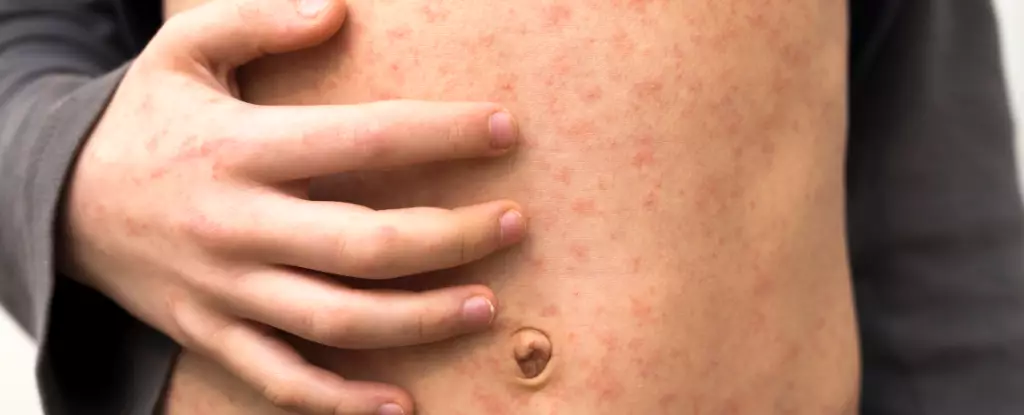The resurgence of measles in the United States, particularly evident in the recent outbreak across west Texas, has raised alarm among public health officials and citizens alike. As of March 28, 2025, there have been over 400 confirmed cases in Texas alone, with additional clusters emerging in New Mexico and Oklahoma. These numbers might just be the tip of the iceberg, as many believe the actual count could be significantly higher, surfacing concerns about a potential national crisis. The implications are stark: what many perceive as a relic of the past is rapidly becoming a contemporary public health concern.
This outbreak exemplifies a growing trend, with measles crossing state lines through various modes of transportation, including planes and trains, with infected individuals unwittingly exposing others in transit. Locations such as Washington Dulles International Airport and Amtrak services have become focal points of concern, shining a light on the interconnectedness of our travel habits and the vulnerabilities they create in public health safety. Individuals who venture out, particularly those unvaccinated, are weaving a precarious web that could lead to extensive transmission of the virus.
The True Nature of Measles
Understanding measles requires more than just acknowledging its highly contagious nature; it demands a recognition of the severe consequences it can impose. The perception of measles as a mere childhood rash and fever must be challenged by the reality that the disease can lead to severe complications, including lung damage and brain impairment. In 2025, approximately 14% of measles cases have resulted in hospitalization—this figure is startlingly higher, at 40%, when observing last year’s data.
Importantly, the severity of the disease can lead to lasting health issues; the battle against measles is far more than just physical symptoms. The virus attacks the respiratory system first, often wreaking havoc on lung function and leading to conditions like viral pneumonia, which notably affects 1 in 20 children afflicted with the virus. The long-term implications are chilling: three in 1,000 cases result in fatalities, highlighting the grave stakes at hand.
Fragile Immunity: The Double-Edged Sword
Compounding the issue, emergent research indicates that contracting measles may compromise the immune system’s ability to fend off other infections. While vaccinations have successfully mitigated the occurrence of measles, the unvaccinated population—mostly comprised of those under 50 who have never witnessed the disease firsthand—risks not only their own health but also that of the broader community. The two-dose measles vaccination regimen boasts a formidable 97% efficacy, yet the danger lingers in the complacency surrounding unvaccinated individuals.
Measles undermines the immune system in ways that may only become apparent years later, as the virus can elude detection and reactivate under certain conditions, notably in children who contract the virus at an early age. This revelation underscores the urgent need for education surrounding vaccination and active individual and public health responsibility.
The Deadly Legacy of Measles
The most severe legacy associated with measles is perhaps subacute sclerosing panencephalitis (SSPE), a progressive neurodegenerative disorder that typically emerges several years post-infection and is nearly always fatal. An estimated 1 in 25,000 individuals infected with measles will develop this dire condition, with an alarmingly higher frequency in infants who contract measles, emphasizing the grave risks faced by the youngest and most vulnerable populations.
As the virus continues to evade comprehensive understanding, researchers are battling against time to develop new therapies, including antibody treatments aimed at severe cases. However, the harsh reality remains that the most effective way to confront the threats posed by measles lies in prevention. The call to action echoes through discussions about the importance of vaccination.
Public Health as a Collective Responsibility
In the face of rising measles cases, the emphasis should be placed not solely on individual health but also on the health of society at large. Collective immunity plays a pivotal role in safeguarding those who cannot be vaccinated due to medical reasons or advanced age. The reemergence of diseases once thought to be under control serves as a stark reminder that complacency can lead to dire consequences.
It is incumbent upon all of us to recognize the significance of vaccination—not merely as a personal choice but as a societal duty. The urgency of combating the recent outbreak cannot be overstated; public awareness and proactive measures are crucial in empowering communities to fend off the returning specter of measles. Ultimately, the responsibility lies with each individual to contribute to a healthier future through informed decisions about vaccinations, with the hope that forthcoming generations remain protected against this avoidable threat.


Leave a Reply